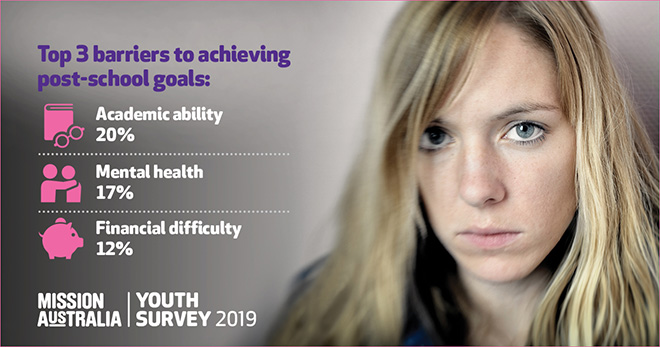Youth worries about mental health and the environment

The young are supposed to be care free but that isn’t the case, many are deeply concerned about mental health, the state of the world’s climate and the persistence of bullying
This year’s Mission Australia Youth Survey Report 2019 surveyed young people aged between 15 to 19 years old in Australia.
It's not all bad though, The Youth Survey Report indicates around six in 10 young people felt very happy/happy (60.7%) overall with their lives and are very positive/positive (58.3%) about the future.
The majority of young people are engaged in education and confident in their ability to achieve their study and work goals. Most young people report strong family relationships and are involved in a range of activities.
However for the third year running, mental health is the top national issue. Almost four in ten (36.2%) young people indicated that mental health is an important issue in Australia today. The proportion of young people identifying mental health as an issue of national importance rose substantially from 21.6% in 2016 to 36.2% this year. The top four personal concerns also relate closely to mental health: coping with stress (44.7%), school or study problems (34.3%), mental health (33.2%) and body image (31.0%).
The environment soared from eighth place in 2018 (9.2%) to second place in 2019 (34.2%) of the topics that young people say are important issues in Australia – more than tripling in significance since last year.
Young people were also asked whether they felt they have enough of a say about important issues, with less than one in 10 (7.2%) young people feeling they have a voice all of the time in public affairs. A higher proportion of females than males felt they have a say none of the time in public affairs (55.4% compared with 48.0%).
Mission Australia CEO James Toomey said: “These results clearly indicate that young people in Australia feel disenfranchised and are deeply concerned about a range of important issues. Feeling ignored is perhaps driving young people to engage in other ways to be heard, such as climate strikes.
“It’s vital that all young people have opportunities and forums available to them so they can speak up and shape public matters and policy. Young people’s concerns must be considered when forming policies that affect their lives and futures. Young people must be part of the design of programs or services for young people. They are, after all, the experts in what it is to be a young person in Australia today.”
Young people also expressed that they are facing a range of challenges in their lives. For the first time in 2019, young people were asked whether they had experienced bullying, with more than one in five (21.0%) young people reporting they had been bullied in the past 12 months. Of those who had experienced bullying, eight in ten (79.9%) reported that the bullying took place at school/TAFE/university, just over one third (34.0%) had experienced bullying online/on social media, while around one fifth (18.1%) had experienced bullying at home. Nearly half of young people (47.7%) had also witnessed bullying in the past year. Proportionally, more young people from regional areas than those from major cities had experienced bullying over the past year (24.5% compared with 19.0%).
Mr Toomey said: “Young people are acutely aware of their own mental health and they can certainly see it is a prevailing issue right across Australia.
“This year, our survey also confirms a disturbing level of bullying which young people are experiencing or witnessing. This is unacceptable. Bullying can cause and exacerbate mental health concerns, with potentially harmful and lasting effects on young people’s lives.
“In light of these findings, it’s clear there is urgent need for better investment in programs and initiatives that promote mental health and wellbeing and combat bullying. A greater focus on prevention and early intervention is also sorely needed. By investing in programs that are proven to work, young people will have a better chance of reaching their potential.”
The 18th annual Youth Survey was completed by more than 25,000 young people.